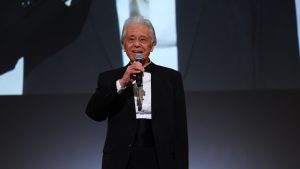
Taylor Swift‘s years-long saga to win back the rights to her first six albums will go down as one of the most significant storylines in the history of the modern music business, as the dispute brought the complex, often dry world of copyright and master ownership further into the national consciousness. At the same time, the conflict grew her own superstardom to stratospheric heights as the Taylor’s Version re-releases became massive hits in their own right.
Swift isn’t the first artist to re-record her music, though the practice will forever be synonymous with her as she took on the ambitious task of recreating her old albums all over again, while also managing to record and release four new albums (Folklore, Evermore, Midnights and The Tortured Poets Department) and net the highest-grossing concert tour of all time.
As Swift announced Friday, she’s officially bought bought back ownership of the records, bringing this chapter to a close. With Swift re-united with her original works at last, let’s take a look back on how we got here today.
June 2019 — Scooter Braun‘s Ithaca Holdings Buys Big Machine
The saga began on June 30, 2019, when the news dropped that Scooter Braun, then-manager to stars like Justin Bieber and Ariana Grande, had bought Scott Borchetta’s Big Machine Label Group for $300 million through his company Ithaca Holdings. With the deal, Ithaca got the rights to music from acts like Florida Georgia Line, Thomas Rhett, Reba McEntire, and of course of Swift, who was Big Machine’s biggest act until she left the label for Universal Music Group’s Republic Records in 2018.

Swift quickly voiced her displeasure with the sale, taking to her Tumblr that day to say she learned of the deal “as it was announced to the world,” calling it “my worst case scenario,” while citing “incessant, manipulative bullying” from Braun for years.
“Any time Scott Borchetta has heard the words ‘Scooter Braun’ escape my lips, it was when I was either crying or trying not to,” Swift wrote at the time. “He knew what he was doing; they both did. Controlling a woman who didn’t want to be associated with them.”
Borchetta responded with a long missive of his own that day, denying Swift’s claim that she hadn’t heard about the sale before the announcement while also adding he’d “never experienced” seeing Swift’s negative reactions about Braun.
August 2019 — Swift Confirms Plans to Re-Record Her Big Machine Era Music
Within two months of the sale, Swift confirmed that she planned on re-recording her music so she could gain control of the masters on at least a version of her first six albums. In an interview with Robin Roberts on Good Morning America in front of scores of Swifities, Swift said “It’s something I’m really excited about doing, because my contract says that starting November 2020, I can record albums one through five all over again.”

November 2019 — Swift Said Braun and Borchetta Wouldn’t Allow Her to Play Old Songs at AMAs
Swift took to Twitter on November 14, claiming that as part of the American Music Awards honoring her as artist of the decade, she wanted to perform a medley of her hits, but that Braun and Borchetta were blocking the use of those songs “because they claim that would be re-recording my music before I’m allowed to next year.”
Braun posted that he and his family received death threats, further stating that “as the world now knows you can and should perform any song you would like at the AMAs. I have never and would never say otherwise. You do not need anyone’s permission to do so legally but I am stating it here clearly and publicly so there is no more debate or confusion.”
Swift played the medley at the AMAs.
2020: Ithaca Sells Swift’s Catalog to Shamrock Capital

On Nov. 16, 2020, Shamrock, a private equity firm founded by Roy Disney, purchased Swift’s catalog from Braun and Ithaca for about $300 million, netting Braun as much as he paid for the entirety of Big Machine the year prior. Swift came forward about the sale that day, writing that “this was the second time my music had been sold without my knowledge.”
Swift claimed that her team had attempted to enter into negotiations with Scooter Braun, writing: “Scooter’s team wanted me to sign an ironclad NDA stating I would never say another word about Scooter Braun unless it was positive, before we could even look at the financial records of BMLG (which is always the first step in a purchase of this nature). So, I would have to sign a document that would silence me forever before I could even have a chance to bid on my own work.”
As Shamrock sold the catalog to Swift nearly five years later, Swift thanked the company Friday for “being the first people to ever offer this to me.”
That assertion has come under scrutiny by people with knowledge of the initial Shamrock acquisition, with a source close to Braun telling The Hollywood Reporter, “There’s documented proof, by way of verified emails, confirming Taylor Swift was offered the opportunity to buy back her masters prior to Shamrock Capital’s acquisition. This has been reported on at length over the last several years.”
A 2023 report from Music Business Worldwide also revealed conversations between Braun and Swift’s camps for a deal before going to Shamrock, though that clearly never happened.

2021 — 2023: The “Taylor’s Version” Era Takes Over
On Feb. 11, 2021, Swift confirmed that Fearless, her first No. 1 album, would be the first album she’d re-record from the Big Machine era, launching her famed “Taylor’s Version” series.
“I’ve spoken a lot about why i’m remaking my first six albums, but the way I’ve chosen to do this will hopefully help illuminate where i’m coming from,” Swift wrote at the time. “Artists should own their own work for so many reasons, but the most screamingly obvious one is that the artist is the only one who really knows that body of work.”
Fearless (Taylor’s Version) officially released in April of 2021. She released Red (Taylor’s Version) that same year, then released Speak Now (Taylor’s Version) and 1989 (Taylor’s Version) in 2023. The re-recordings became immensely successful as well; 1989 (Taylor’s Version) managed to sell 1.3 million units in the first week alone, besting 1989’s debut from a decade prior, even as record sales have fallen since then amid the streaming era.
According to Luminate, in the U.S. alone, Fearless (Taylor’s Version) has sold 3 million units, Red (Taylor’s Version) sold 5.2 million, Speak Now (Taylor’s Version) has sold 2.7 million and 1989 (Taylor’s Version) has sold 4.9 million.

May 30, 2025: Liberation Day
Swift rocked the industry once again Friday as she announced she’d closed the deal with Shamrock, bringing “my entire life’s work” back into Swift’s possession. Swift didn’t disclose financial details of the sale. Billboard reports the deal was worth about $360 million, while a Page Six report from earlier this suggested it could be worth twice that.
“I’ve been bursting into tears of joy at random intervals ever since I found out that this is really happening,” Swift said. “I really get to say these words: All of the music I’ve ever made… now belongs… to me.”
Following the reveal, Braun told THR he was “happy for her.”
As for the two remaining Taylor’s Version albums, Swift revealed in her letter that she hadn’t recorded more than a quarter of Reputation (Taylor’s Version), but that the remake of her debut album was done.

“Those 2 albums can still have their moments to re-emerge when the time is right, if that would be something you guys would be excited about,” Swift wrote. “But if it happens, it won’t be from a place of sadness and longing for what I wish I could have. It will just be a celebration now.”
#Taylor #Swift #Masters






